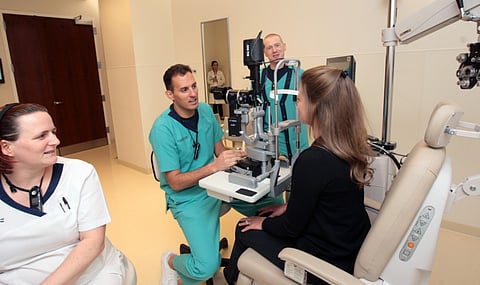Cleveland Clinic fully open for patients
Hospital offers advanced treatment for common medical conditions related to diabetes, heart disease

Abu Dhab: The high prevalence of diabetes in the UAE means that there is a profound need for advanced ophthalmological treatment, as well as for services that address heart and vascular diseases.
The Cleveland Clinic Abu Dhabi, which opened all its units today (May 31), hopes to address these needs for patients while removing the need for them to travel abroad for care, officials at the health-care facility told Gulf News today (May 31).
“One of the most common side effects of long-standing diabetes is disturbance of vision, especially through retinal diseases. Many of these require laser treatments on an urgent basis, and we have the capacity to offer these. In fact, nearly two-thirds of the patients we expect to see at our Eye Institute will be treated for conditions linked to diabetes,” said Dr Tomislav Mihaljevic, the clinic’s chief of staff and chief of its Heart and Vascular Institute.
“In addition, diabetics also tend to suffer from cardiovascular conditions, such as blockages of the heart. These are conventionally treated through surgeries that involve large incisions, or through the use of interventional catheters. We are bringing in techniques that allow for these procedures to be conducted with tiny incisions, along with a hybrid approach and use of interventional methods. Such procedures are a novelty in the region,” he added.
The 364-bed facility, which began opening its various units in March, today (May 31) opened its 44-bed Emergency Department. It is part of a growing network of medical facilities in the emirate by investment and development company Mubadala.
The hospital boasts 182 physicians, 80 per cent of whom come from institutions in the United States, and one-third of them have medical experience at the Cleveland Clinic in Ohio.
“We have had a long-standing presence in the region [through management of Shaikh Khalifa Medical City], and understand its demographics and health-care needs. So, our services have been tailored, under the mandate of the Health Authority Abu Dhabi, to complement the range of health-care services that are already being offered in the emirate,” said Dr Marc Harrison, chief executive officer at the clinic.
Since March, the facility has booked 8,500 outpatient appointments at its various departments.
Despite its offering of care for 30 medical and surgical specialities, the clinic will however not function as a trauma centre. It also does not provide treatment for paediatric, orthopaedic and gynaecological concerns, or for children below the age of 14 outside its Eye Institute.
So far, the clinic only covers Emirati patients, who have access to government-mandated Thiqa insurance, as well as some enhanced insurance plans provided by the National Health Insurance Company (Daman) to expatriate residents. But Dr Harrison said that the facility is currently in active negotiations with other payers so that a greater range of insurance plans can be covered, and this range is expected to be expanded by the end of the year.


